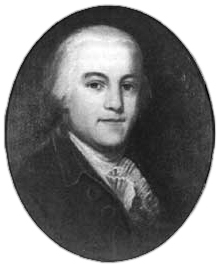George Gabriel Powell
George Gabriel Powell (c. 1710 – 1779) was an acting governor of St Helena, who left the island in 1748, relocating to South Carolina, where he became a colonel in the state’s militia and the first speaker of its Provincial Congress (1775–76).
[5] But St Helena historian Thomas Brooke, an ex-Governor of the island, claimed that Powell deliberately ingratiated the directors of the East India Company by exposing fraud in order to gain a position from which be could perpetrate even worse excesses.
[6] However, caution should be exercised, as almost all the sources for the St Helena period are hostile to the Powell family, partly because all three generations had, at some stage, come into direct conflict with the Governing authorities of the island.
[10] As early as 1752, he was elected as a member for Prince George Parish in the Colony of South Carolina’s Commons House of Assembly and was appointed to a committee to report back on a petition from the locals for courthouses and law-enforcement measures.
[12] Almost a decade later, he took a leading role in an attempt to quell disturbances in the ‘Back Country’ by a group ex-slaves and small landowners led by an armed band known as the ‘Regulators’.
[13] Powell had been dispatched with a small force to arrest Gibson and bring order back to the frontier areas of the Pee Dee.
[14] On 26 August 1768, William Bull, informed the Council, that he had received a letter from Colonel Powell in which he had described his inability to pacify the district and how even his own men sympathized with the Regulators and refused to act against them.
In 1772, as a magistrate in Charleston, appointed directly by the Commons House, he sided with another pro-Independence judge to support Edward Rutledge in advocating on behalf of an incarcerated printer.
Powell’s speech was a carefully crafted justification of the war and a polite reminder for the Governor that the new constitution provided the overriding principles of government, to which he should adhere.
[20] Whatever is thought about the infamy of Powell and his antecedents on St Helena, this speech helps explain his family’s ideological position concerning the excesses of British colonialism.
The second example occurs in April 1778, after set backs for the Americans in Philadelphia, when the general expectation amongst the South Carolina commanders is that they should all pitch in to reinforce Washington in the north.
[24] In early 1776 Powell faced intense criticism of his mission to build a new fort at Cheraw Hill to shore up the northern reaches of the State and to garrison this stockade with supplies of gunpowder and a force of 50 men.
No man of the time had occupied a more conspicuous or honorable place in all connected with the public interests of the Pedee than George Gabriel Powell.
Having early won the confidence and affection of the people on the Pedee, he retained his place in their esteem with singular uniformity through years of eventful changes, relinquishing at times, in their behalf, positions of more commanding influence, returning to their service as his first love, and devoting to it his mature labours to the end of his career.
[27]If Gregg had been aware of Powell’s disgrace as the acting Governor of St Helena, and the brutal treatment of the slaves, who worked on his plantations, his obituary might not have been so positive.


